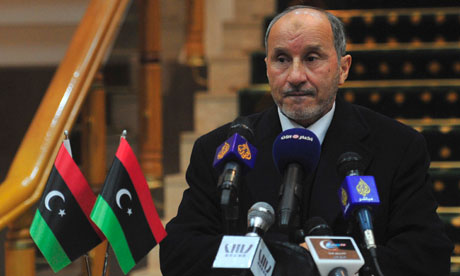Libya is not a divided country
The NTC may be less than a lame duck, but media reports about Libya being on the brink of civil war are absurd

Mustafa Abdel Jalil, chairman of the Libya's National Transitional Council. Photograph:Stringer/Reuters
Since I returned from a week in Libya a few days ago there have been some bad headlines, for example "Protesters storm Libyan government HQ in Benghazi" and "Gaddafi loyalists seize Libyan town". It was my first visit since the revolution, and I have already written about my impressions, which were favourable and sometimes inspiring. Was I wrong?
First, a word about the media situation. Foreign correspondents move freely in Libya. Ordinary Libyans have found their voice, and there is a flood of new Arabic language newspapers, which have yet to prove themselves. The National Transitional Council is lamentably weak in strategic communication and has failed to make public even basic facts like the names and number of members.
As a result, news stories have to be looked at critically. While I was there I heard two stories that never made the media: two people "executed" in central Tripoli, quite close to my hotel, and four international officials kidnapped in the far south. Neither story turned out to be accurate – the "execution" was of two would-be carjackers who happened to pick on a car full of armed militia, and the "kidnapping" was the temporary detention of four foreigners driving in an unmarked car in the desert without papers.
Bani Walid, the town reportedly seized by Gaddafi loyalists, is quite remote. It is also untypical, perhaps unique in Libya, in that its inhabitants are virtually all from one tribe. Since the first reports of what happened there a day or two ago, a more complicated story has begun to emerge (as reflected in more recent reports). A fighter with the revolutionary forces had claimed that Gaddafi loyalists were flying green flags in the central town, but it now appears that this is not true. We are left with a serious breakdown of law and order in which at least four people were killed.
The transitional government will only be in power until the summer. If plans work out it will then hand over to an elected government. It is not even a lame duck, because it never walked on two legs. It faces many interlinked problems, the most urgent being security, humanitarian relief and kickstarting the economy.
So long as there are weapons on the street out of government control everything is at risk. Libya lives on oil revenues, but its assets have been frozen and oil production halted. These are just the short-term problems; after that come retraining the workforce and building an economy that does not depend on subsidies and which pays proper wages. Civil society and all political activity were eliminated entirely under Gaddafi; they are only now reappearing.
On the positive side the oil assets remain, so there is a prospect of prosperity. Assets have been unfrozen, even if they are not yet always accessible. Oil production is now more than half the pre-revolution level. Problems of lack of cash remain a nightmare, but the worst is expected to be over by the end of March although it will be impossible to balance a budget this year or next.
Contrary to what many people suppose, Libya is not a divided country. It is almost 100% Sunni Muslim and tribal differences are social rather than political, and in any case not strong in the majority of the population who live in the four main cities. Unlike Tunisia and Egypt, which have suffered from a corrupt form of free capitalist economy, Libya suffered from a corrupt form of centralised socialist rule, so that those who are active in trying to develop the private sector are working with the grain, not against it.
Considerable progress has been made on security. I personally heard no shooting, although there was some even in central Tripoli during my visit. During a visit to Misrata, two-and-a-half hours by bus, we were only asked to show passports once, which I believe was very different from the situation a few weeks ago.
The threat of political or violent Islam was not mentioned to me by anyone I met. Libyans take for granted that Libya is a Muslim country, and that its institutions will be based in Islam, but they claim to be moderate (churches that cater for non-Libyans appear to have been unaffected by the revolution). They are worried about jihadist activity in the Sahara, and working with their neighbours to control the Sahara borders is their top foreign policy priority. It is curious to reflect that Gaddafi's Libya was the only Saharan country in which there were no al-Qaida-type atrocities in the last 10 years or so. I do not know how that was done, or whether the new Libya will be able to keep up the record.
Overall, the situation is fragile and things could still go wrong. But there is a plan that leads to constitutional and democratic government, and the leadership are trying to stick to it. Media reports that referred to "the brink of civil war" struck me as absurd when I was there. Reports I have seen since have not made me change my mind.
• Follow Comment is free on Twitter @commentisfree

ليست هناك تعليقات:
إرسال تعليق